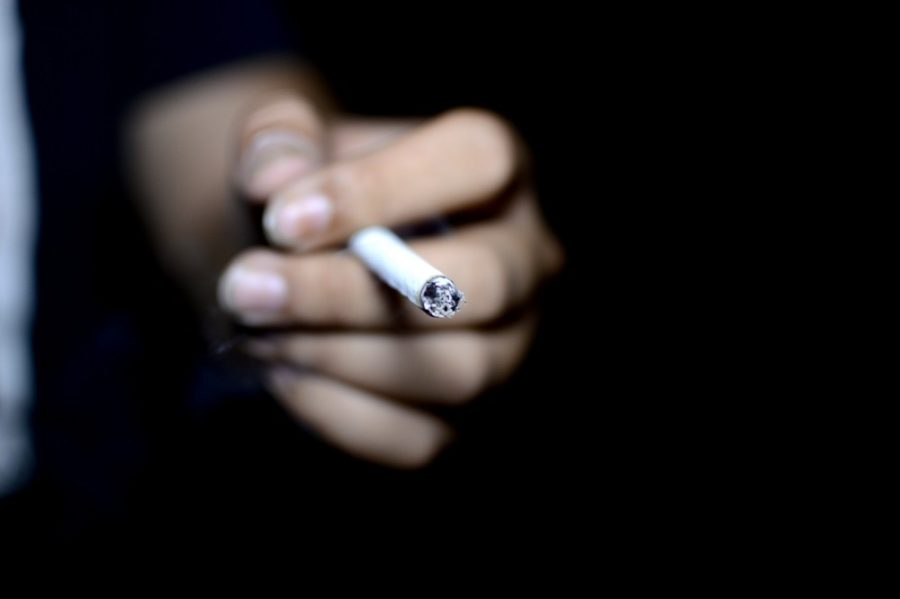The idea of having tobacco on campus is off-kilter and not the first thing people would think of as beneficial to the campus.
Most people are probably wondering, “How would removing the tobacco ban on campus benefit us as a whole?” With this question in mind, I shall bring to thee a new light, a revolutionary way of thinking about this topic.
Despite the ban on smoking, a good amount of people still smoke on campus and on surrounding streets.
For some reason, the whole cancer thing does not seem to deter our generation. If you do not believe me, look at the ground just about anywhere you walk.
Cigarette butts clutter every crevice, polluting the environment with their inability to disappear magically into thin air like the unnatural, poison smoke they produce.
Related: Cancer Center speaker informs audience on vaccine for throat cancer
Now, most people on campus smoke because of stress, and since the healthier alternative is illegal, they find themselves puffing on the emphysema stick (I would have used the more well-known term “cancer stick,” but I already mentioned cancer).
Now these smokers, either being lazy and/or not fire safe, will forgo snuffing the cigarette out and finding a nonexistent, proper place to dispose the butt, will throw it directly on the ground. This leads to the clutter.
According to Keep America Beautiful, “The overall littering rate for cigarette butts is 65 percent, and tobacco products comprise 38 percent of all U.S. roadway litter.”
Anywhere a butt is placed, even if disposed in planters, is not considered a proper disposal and is, in fact, considered littering.
The solution to this problem is quite a simple one:
If campus were to place cigarette butt disposal systems around campus, this would greatly reduce the amount of litter on the ground around the campus.
These disposal systems can be placed next to trash cans or benches or anywhere you normally see a not-so-appealing, yet majestic cloud of smoke floating through the air. (I must say I have always been fascinated by the way smoke goes through the air, possibly one of the only beautiful things about the habit.)
An addition of attached ashtrays to outdoor tables could also help the problem.
Thus, the UA can maintain a tobacco-free image all the while providing conveniences to smokers. Being a low-key hypocrite has always been an American favorite.
Though I am unaware whether the campus gets kickbacks from the government for being an almost unenforced “Tobacco Free” zone, if this is the case, I believe the UA can do better than kickbacks from the state. They can just do what the state does, which is sell cigarettes.
Related: UA bans E-cigarettes in update to Tobacco Campus Use Policy
The state of Arizona taxes cigarettes $2 per pack, putting them at a high-ranking and high-earning position of 11th-highest in-state cigarette taxes. They don’t call them “sin taxes” for no reason.
This should answer your question on whether the American government and the state of Arizona know that a ban on Tobacco would be a terrible idea: Cigarettes, like alcohol, are addictive, and people do not care what it costs when it is an addiction; see, they call them “sin taxes” because greed is one of the seven deadly sins.
The government is in bed with big tobacco, knowing high taxes will not stop smokers from smoking but only turn a profit. (Why would they care about public health? Profit is more important, no? Profit on cigarettes and profit on the ineffective chemicals they call “medicine” from the effects of the cigarettes.)
If more revenue is desired, the UA could also add a fee to students who would buy a pack of cigarettes on campus. Everything on campus is overpriced, and people swiping their CatCards through the machine probably don’t take a second look at the price to even notice this.
My vision is a UA that sells Marlboro cigarettes to its student body and receives finances from it to better facilities and increase wages for the maintenance workers and professors.
If the smoking on campus does not decrease, making the UA a tobacco-supporting campus would truly benefit the university.
Follow Chuck Valadez on Twitter.









